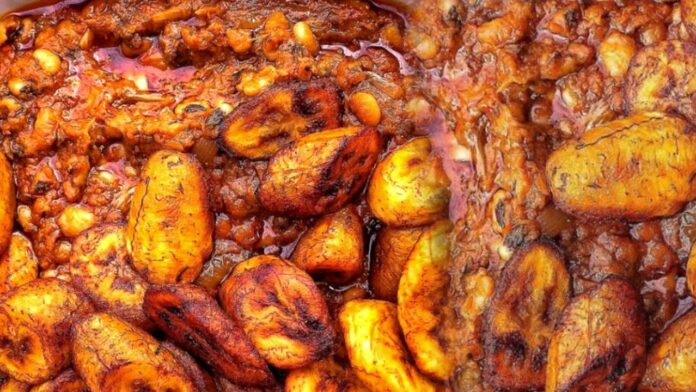A study by the Environmental Protection Agency (EPA) and Pure Earth has revealed alarming levels of mercury, arsenic, lead, and other toxic metals in areas of Ghana affected by illegal small-scale gold mining, otherwise known as “galamsey”.
The research, which covered the Ashanti, Eastern, Central, Western, Western North, and Savannah regions, shows how galamsey is silently harming gari (cassava grits), and palm oil, two of the basic ingredients in one of Ghana’s favourite meals – gari and beans – commonly called ‘Gobɛ’, ‘yo k3 gari’, or ‘red red’.
Shrinking Farmlands
Galamsey is devouring farmlands that once produced cassava and palm fruits.
Miners dig up fertile soil, leaving behind deep pits, stones, and waste that make farming almost impossible. Many farmers lose their land to mining and are forced to abandon farming or relocate.
The result is reduced cassava and palm fruit production, leading to higher prices of gari and palm oil.
Dirty water for processing
The study found unsafe levels of lead and arsenic in several boreholes and streams near mining sites. This is especially worrying because clean water is essential for washing, fermenting, and boiling cassava and palm fruits.
Rivers once used for food processing are now muddy and contaminated with chemicals such as mercury and cyanide.
Many women who process gari and palm oil are left with no option but to use polluted water. The outcome is lower-quality products that may pose health risks to consumers.
Heavy metals in food
Toxic chemicals from illegal mining do not remain in the soil; they enter crops and, ultimately, food.
The study detected traces of mercury, arsenic, and lead in crops such as cassava, cocoyam leaves (kontomire), tomatoes, and maize.
Cassava roots and palm trees absorb these metals from the soil during growth.
This means gari and palm oil made from such crops could expose people to harmful toxins, which, over time, may lead to kidney and liver damage.
The Bigger Picture
With farmlands destroyed and water bodies polluted, food production continues to decline.
As gari and palm oil become more expensive, gobɛ – the affordable, protein-rich meal loved by millions – becomes difficult for the average consumer to afford.
Women and young people who depend on processing and selling gari or palm oil also lose their livelihoods, worsening poverty in mining-affected communities.
The Bottom Line
Illegal mining is not just destroying the environment, it is endangering food security, public health, and cultural heritage.
Protecting Ghana’s land and water means safeguarding the meals that bring people together, including the humble but powerful gobɛ that feeds millions every day.
Government Response
President John Dramani Mahama, speaking at a recent meeting with civil society organisations (CSOs), reaffirmed the Government’s commitment to sustaining the fight against illegal mining through stronger enforcement, the use of new technologies, and collaboration with CSOs.
“I want to assure you that we are determined to win this fight, and your contributions, your criticisms, your pressure, putting fire under our feet, we don’t have any problem with that. We welcome it,” he said.
“This is not an event; it is a process, and we are determined to win this fight,” the President told a gathering of CSOs, faith-based organisations (FBOs), and environmental groups.
He added that the Government was strictly enforcing laws that required permits and regulation of excavator importation, warning that shipping agencies would be penalised if they transported excavators without prior authorisation.
President Mahama said all excavators would now be registered and fitted with tracking devices to monitor their movement.
The deployment of “Blue Water Guards” to rivers such as the Ankobra was already yielding positive results, he added.
GNA



